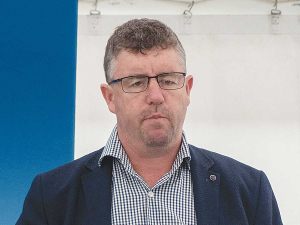Risky business
OPINION: In the same way that even a stopped clock is right twice a day, economists sometimes get it right.
 Economist Cameron Bagrie says the current rural inflation rate of around 15% is ‘absolutely breathtaking’.
Economist Cameron Bagrie says the current rural inflation rate of around 15% is ‘absolutely breathtaking’.
"Absolutely breathtaking" is how well known economist Cameron Bagrie describes the current rural inflation rate of around 15%.
Bagrie says this compares with general inflation of just over 7% and business inflation sitting at around 10%. He says the tell-tale indicator of what’s happening to the country is the tax take.
Bagrie points out that in the last three months the tax numbers have “massively undershot” government expectations, which is borne out on payments of provisional and terminal tax. He says this is showing a flaw in the ideology that you can pump more costs onto the rural sector and there will be no collateral damage.
“But there is collateral damage and the real story here is about costs,” Bagrie explains. “What we are seeing now is that ideologies are being checked by economic reality. The economic reality is a big wake-up call for the Government because if firms are not making money, they don’t pay tax and the Government doesn’t have enough money to redistribute.”
Bagrie says it’s still early days and questions remain about what those numbers will look like in the future. He says, in the case of the primary sector, there is a need for a strong sales side and at the moment commodity prices are still volatile.
He says of all the sectors, the dairy industry to some degree has put itself in a more resilient position to counter this. Bagrie believes this is because over the past five years, farmers have made a point of paying down a lot of debt.
He says the sector is still facing the double whammy of high inflation and higher costs, which are affecting their bottom lines. He adds that the sector has been helped a bit by the NZ dollar, but the banks have pulled back on their expectations of what the dairy payout may be.
Bagrie says the dairy industry, like all businesses in NZ, will have to ruthlessly look at their bottom lines, cutting costs and recalibrating their operations.
He says this will be hard, given some of the environmental challenges that farmers have got coming – along with the ideological-driven policy agenda that’s been coming out of Wellington.
“The reality is that farmers won’t be paying as much tax and that will affect the economy.”
The World Wide Sires National All Day Breeds Best Youth Camp Best All Rounder plaudit has become family affair, with 2026 Paramount Cup winner Holly Williams following in her sister Zara's footsteps.
DairyNZ is giving New Zealand farmers a unique opportunity to gain hands-on governance and leadership experience within the dairy sector.
Herd improvement company LIC has posted a 5.2% lift in half-year revenue, thanks to increasing demand for genetics.
According to the latest Fresh Produce Trend Report from United Fresh, 2026 will be a year where fruit and vegetables are shaped by cost pressures, rapid digital adoption, and a renewed focus on wellbeing at home.
The Roar is a highlight of the game hunting calendar in New Zealand, with thousands of hunters set to head for the hills to hunt male stags during March and April.
OPINION: The past few weeks have been tough on farms across the North Island: floods and storms have caused damage and disruption to families and businesses.

OPINION: Meanwhile, red blooded Northland politician Matua Shane Jones has provided one of the most telling quotes of the year…
OPINION: This old mutt has been around for a few years now and it seems these ‘once in 100-year’ weather…